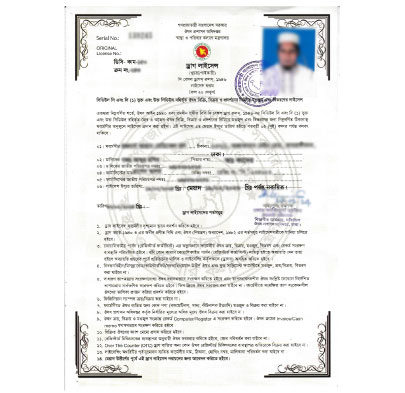Drug License
Details About Drug License in Bangladesh
In Bangladesh, the pharmaceutical industry plays a crucial role in ensuring the health and well-being of the population. To operate within this vital sector, obtaining a drug license is not just a regulatory requirement but also a mark of credibility and trustworthiness. This guide provides a detailed overview of drug licensing in Bangladesh, covering the types of licenses, the application process, and compliance requirements.
What is Drag License?
A drug license is an official document issued by the Directorate General of Drug Administration (DGDA) under the Ministry of Health and Family Welfare. This license authorizes manufacturers, wholesalers, retailers, and importers to engage in the distribution and sale of pharmaceutical products. The primary objective of the drug license is to ensure that all drugs sold in Bangladesh meet safety, efficacy, and quality standards.

Importance of Drug Licensing
- Consumer Safety: A drug license helps to safeguard public health by ensuring that only quality medicines are available in the market.
- Regulatory Compliance: Having a valid drug license is mandatory for legal operations in the pharmaceutical sector.
- Market Credibility: A licensed business earns trust among consumers, healthcare professionals, and regulatory bodies.
- Access to Resources: Licensed businesses can more easily access essential resources and participate in public health initiatives.
Types of Drug Licenses in Bangladesh
The DGDA issues several types of drug licenses, depending on the nature of the business. These include:
Manufacturing License: Required for companies that produce pharmaceutical products. This license ensures compliance with Good Manufacturing Practices (GMP).
Wholesale License: For distributors who purchase drugs in bulk and supply them to pharmacies or healthcare facilities.
Retail License: Required for pharmacies and drug stores that sell medications directly to consumers.
Import License: Necessary for businesses involved in importing pharmaceutical products from other countries.
Export License: For companies that intend to sell their products in international markets.
The Application Process for a Drug License
Obtaining a drug license in Bangladesh involves a systematic application process. Here’s a step-by-step guide:
1. Preparation of Documents
Before applying, ensure you have the necessary documents, including:
- Business registration certificate
- Tax Identification Number (TIN)
- Proof of premises (lease agreement or ownership documents)
- Details of the responsible pharmacist
- Product information (if applicable)
2. Submission of Application
The application must be submitted to the DGDA. This can often be done online through the DGDA’s official portal. Ensure all documents are complete to avoid delays.
3. Inspection
Once the application is submitted, an inspection will be conducted by DGDA officials. They will evaluate the facilities, equipment, and practices to ensure compliance with regulations.
4. Approval and Issuance
If the inspection is successful and all criteria are met, the DGDA will issue the drug license. This license typically remains valid for a specified period, after which it must be renewed.
Compliance and Regulations
Once you have obtained a drug license, maintaining compliance with regulations is paramount. Here are some key areas to focus on:
Good Manufacturing Practices (GMP)
Manufacturers must adhere to GMP guidelines, ensuring that products are consistently produced and controlled to quality standards. This involves regular audits and quality assurance practices.
Record Keeping
Pharmacies and wholesalers must maintain detailed records of all transactions, including purchases and sales, to facilitate traceability and accountability.
Reporting Adverse Events
Any adverse drug reactions or quality issues must be reported to the DGDA promptly. This helps in monitoring the safety of pharmaceutical products in the market.
Renewal of License
Drug licenses are not permanent. Businesses must renew their licenses periodically, usually every five years. This process involves submitting updated documents and possibly undergoing another inspection.
Challenges in Obtaining a Drug License
While the process is well-defined, several challenges can arise:
- Complex Regulations: Navigating the regulatory landscape can be daunting, especially for new entrants.
- Inspection Delays: The timeline for inspections may vary, leading to delays in obtaining the license.
- Compliance Costs: Maintaining compliance with GMP and other regulations can incur significant costs, particularly for small businesses.
We, at divisional consultancy, assists you to obtain Drug License
Divisional Consultancy, a full-fledged consulting institution that aims to provide a wide range of services to clients rather than focusing solely on a particular area of service. Renowned as one of Bangladesh’s premier consulting firms, it serves a broad spectrum of clients, spanning both local and global demographics, ensuring their needs and aspirations are met with precision and expertise.
In Order to obtain Drug License, the services Divisional Consultancy can provide are as follows:
- Advisors of divisional consultancy can assist the clients through consultations and meetings and ask them to provide necessary documents, in order to apply for Drug License.
- Our experts can prepare all relevant drafts of documents, which are necessary for obtaining the Drug license, which is then shared with clients for execution.
- Then completes the application by submitting the supporting documents to the concerned authority and liaise with them to obtain the certified copy of Drug License.
- Our experts have good working relation with government offices; for example, City Corporation, RJSC Office, NBR Office etc, which makes it easier to obtain any certificate.
- Divisional Consultancy also provides services of renewing the License, if it expires by taking necessary steps at the right time.
